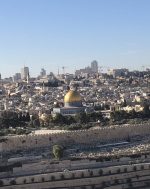The Nakba continues to unfold

Al Aqsa complex at a more peaceful time. Photo by Sander Crombach on Unsplash
/ FAITH, HOPE…

“Some people say there is a God; others say there is no God; the truth probably lies somewhere in between”
– W. B. Yeats
The Palestinians are said to be marking al-Nakba (literally, the catastrophe) today, May 15. On this day, day 73 years ago, 750,000 of them lost their homes and became refugees.
It was the consequence of Israel’s declaration of independence on May 14, 1948 and the end of British control, by League of Nations mandate, of Palestine and Transjordan.
The Arab-Israeli war began the very next day. Arabs in the former Mandate Palestine, as it was called, fled or were expelled by Israeli forces. Whatever else remained to be done was achieved in 1967, when hundreds of thousands of Arabs were displaced by fighting in the West Bank and Gaza Strip in June 1967.
Mention of the League of Nations, the world’s first intergovernmental organisation, which folded in 1946 after a 26-year run, underlines the old-fashioned feel of the events outlined above around al-Nakba.
The Nakba continues. It never really ended.
Three quarters of a century have elapsed and look at where we are today. Israelis—Jewish and Arab—are clashing in cities across Israel. Journalists on the ground in Lod, southeast of the capital Tel Aviv, say it’s looking like a warzone with a line of burnt-out vehicles extending from the main marketplace to the entrance to city. In Acre a port city in northwest Israel, an Arab mob set fire to Jewish-owned businesses. In Jaffa, a further horrific tragedy ensued when a 19-year-old Jewish soldier had his skull fractured by Arabs.
Reading what happened in Jaffa puts the current conflict raging in Israel in context. Arab Israelis —tolerated by their Jewish co-citizens—are clearly enraged by the Jewish far right’s rhetoric and reality. Israel’s intemperate and power-hungry prime minister Benjamin Netanyahu is promising vengeance rather than to bind up wounds, something that is neither in his character nor his political nature. “We will continue to do what we’re doing with great intensity,” he said of the Israeli army’s offensive against Hamas, the equally intemperate Islamist group that rules Gaza. “This operation will continue as long as necessary”.
How many times has Jaffa seen blood being shed, the promise of lasting dominance and the crumbling of a powerful empire?
This is a city so old that it has an association with biblical stories, is mentioned in pharaonic epistles, saw the rise and fall of the Assyrians, Phoenicians and Byzantines, was taken by the upstart Arabs in 636 A.D., passed into the hands of Richard the Lionheart and knew the Mamluks, the Ottomans and the British.
The Quran (3:137) explains the transience of power, pleasure and pain as follows: “Many ways of life passed away before your time/ Then, go about the earth and behold what happened”.

